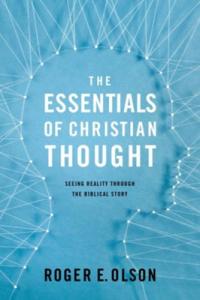Essentials of Christian Thought Book Discussion Begins
Here I begin our discussion of my book Essentials of Christian Thought: Seeing Reality through the Biblical Story. Zondervan gave the book its title. The title I wanted was Narrative Biblical Metaphysics: Seeing Reality through the Biblical Story.
The origin of the book lies in this blog. I blogged about the project of integrating faith and learning in Christian educational institutions. I taught theology in three Christian universities over thirty-five years. I still teach as an emeritus professor in an adjunct role in retirement.
During my time teaching theology in those Christian universities, I became deeply involved in the project of faith-learning integration. I sat through numerous presentations about it and read many books about it. They all disappointed me. I felt that the “faith” part of faith-learning integration was not being explained correctly, or in a way that would turn aside obvious and predictable objections.
An editor at Zondervan contacted me and asked me to write a book based on my blog post(s) about faith-learning integration. This book is the result.
I remember back to one of my first theological mentors, John Newport, who often talked about “biblical metaphysics” and two theologians who had attempted to describe it: Edmond La Cherbonnier, an American theologian, and Claude Tresmontant. I reference them often in this book.
Chapter 1 is Knowing Christianly: Seeing Reality through the Biblical Story and constitutes my account of “soft fideism,” a term I borrowed from Methodist philosopher of religion and theologian William (Billy) Abraham. There I talk also about Wittgenstein and postmodern non-foundational epistemology and postliberal theology. The basic idea is that while Christianity cannot be proven true, once accepted it turns out to be the “blik” or “world perspective” that best explains human experience of reality. It is not irrational even if it cannot be proven. I note that, in postmodern philosophy, very little of any importance can be proven. In other words, faith is essential to Christian metaphysics although reason is not discarded. I rely heavily on James Richmond, a British philosopher of religion worthy of much more attention than he ever received.
Following every chapter is an “Interlude” that serves as a kind of extended footnote or appendix to explain some of what I wrote in the chapter. The purpose is to keep the chapters relatively brief. In the first interlude I discuss postmodern thought and especially that influenced by Ludwig Wittgenstein and Alasdair MacIntyre: perspectivalism. There is no “view from nowhere” but that does not mean relativism.
This discussion is mainly for those who are reading the book. Think of this series as a kind of book club. If you aren’t reading the book, don’t join the discussion except to ask a question. If you are reading the book, give feedback and/or ask questions. I may not be able to answer all questions or respond to all comments. But please comment and ask away. Discuss. Let me know what you think of the chapters and interludes.
*Note: If you choose to comment or ask a question make sure your comment or question is relatively brief (no more than 100 words), on topic, addressed to me, civil and respectful (not hostile or argumentative), and devoid of pictures or links.*














